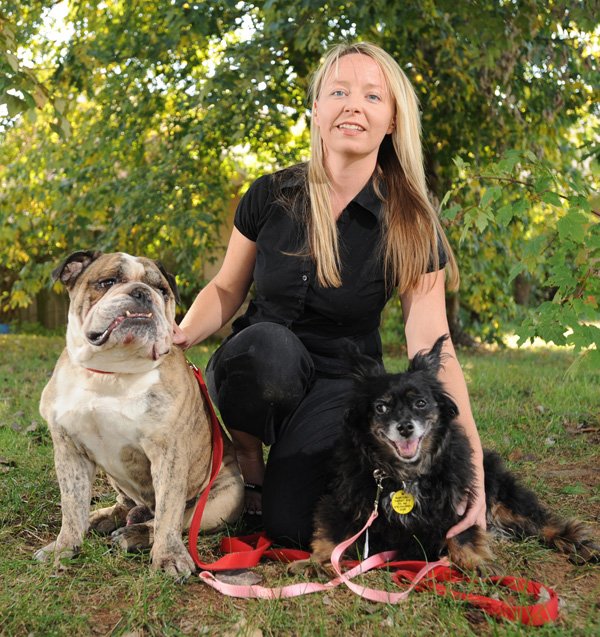FAYETTEVILLE — A new program at the Fayetteville Animal Shelter is giving some dogs a second chance at life.
Shelter volunteer Stephanie Conway is the driving force behind the program, which seeks to place potential therapy dogs into foster care.
“So many amazing dogs get overlooked, especially the bigger, mixed breeds,” she said. “Many of them end up getting euthanized, which is such a waste.”
The Fayetteville Animal Shelter took in 4,910 cats and dogs last year. Nearly half of those were euthanized.
“Therapy dogs go places in the community and offer nonjudgmental, unconditional love,” she said. “One of the greatest places they have an impact is in nursing homes. A lot of the people don’t have family visiting them or won’t even respond to people, but they’ll respond to a dog.”
Conway, who has two therapy dogs of her own, has been volunteering as a “dog walker” at the Fayetteville Animal Shelter for nearly two years. During her time there, she’s come across several dogs that have exhibited the qualities of potential therapy dogs.

“The first dog I walked was so amazing,” she said. “He was kind and gentle and had ‘therapy dog’ written all over him.”
Shelter Superintendent Justine Middleton said the shelter has already identifi ed two potential therapy dogs, “Skip,” a 1-year-old pitbull mix and “Kara,” a golden retriever mix. The two dogs are in foster care, where they’re being taught basic obedience skills.
“I’m excited about this new program because we have some outstanding dogs at the shelter,” Middleton said. “We appreciate it when our volunteers come up with new ideas and share them with us. We plan to use this as a marketing tool to help those dogs fi nd homes.”
Earlier this year, the shelter launched an adoption advocate program that shortened the time animals could be in foster care to three weeks. Historically, volunteers could foster an animal for an unlimited amount of time. Middleton said the shelter’s advisory board has since altered the foster care policy to allow healthy animals to remains in foster care for up to four months. Animals identifi ed as potential therapy dogs can be fostered for six months. After that, they must be returned to the shelter, where they are placed on the adoption fl oor if space permits.
“Usually, people who’ve fostered an animal for four months have a hard time bringing it back to the shelter,” Middleton said. “They often end up making an adoption. Since this time last year, our adoption rate has increased by about 26 percent, which is incredible.”
Conway said therapy dogs must exhibit an outstanding temperament and get along with all people. They’re evaluated on their response to basic commands like, “sit,” “stay” and “down.” Once a therapy dog has been identified, it’s placed into foster care so volunteers can help sharpen the dog’s existing skills.
“The person adopting the dog would have the option of having it certified and evaluated to volunteer in the community,” she said.
In Northwest Arkansas, therapy dogs are used at the Fayetteville Public Library, Washington Regional Senior Unit, Highlands Oncology, Springdale Health and Rehab, Circle of Life Hospice, Peace at Home Family Shelter, the Veteran’s Home and various nursing homes.
Though several people with dog training experience have offered to serve as foster volunteers, Conway said the shelter still needs more foster homes to expand the existing program and to save more animals.

